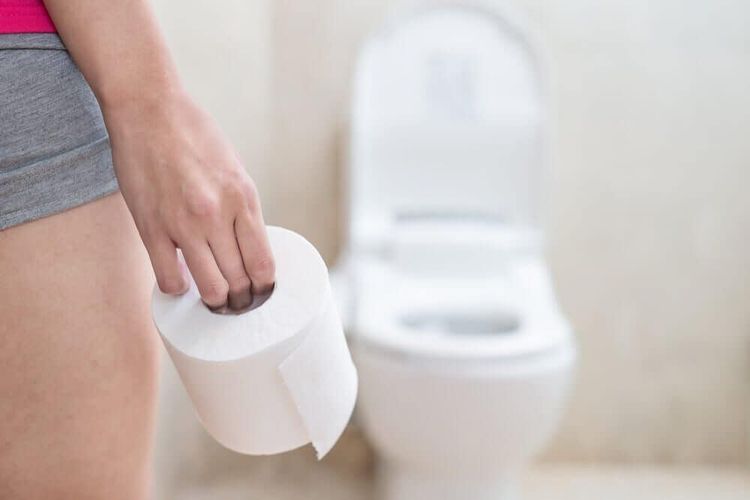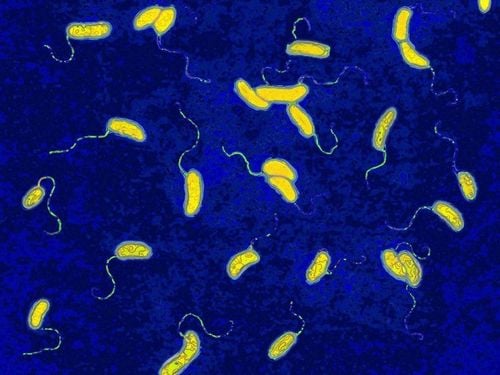This is an automatically translated article.
Worldwide, there are many hospital admissions due to cholera, an infection characterized by vomiting and diarrhea with a frequency of many times, leading to severe dehydration and electrolytes.
1. What is cholera?
Cholera, also known as cholera or cholera, is an acute intestinal infection caused by the bacterium Vibrio Cholerae. Both children and adults can be infected. Manifestations of cholera are mainly vomiting and diarrhea, which can easily lead to severe dehydration and electrolyte loss, severe shock, and cardiovascular collapse. If the patient is not treated promptly, it will lead to death within a few hours.In addition, there is Vibrio parahaemolyticus which is a bacterium in the same group as those that cause cholera. This bacterium lives in brackish salt water and causes gastrointestinal disease in humans.
Cholera often occurs in the summer months (hot-humid climate, many flies, flies, flies...
2. Signs and symptoms of cholera
Common symptoms of Vibrio infection are:
Persistent diarrhea, first with loose stools then watery, diarrhea often described as "rice water" and may have a fishy (sometimes) odor bloody diarrhea). Abdominal pain, bloating Nausea, vomiting, first vomiting food, then vomiting light yellow liquid Fever Headache Fatigue, signs of dehydration - electrolytes, sunken eyes, cold hands and feet Symptoms This cholera occurs within the first 24 hours after eating contaminated food. Usually, symptoms are mild, moderate to severe, and last about 3 days (between 8 hours and 12 days). However, in special cases such as those being treated for cancer, infections may be aggravated by immunosuppression.

Bệnh tả gây tiêu chảy liên tục
3. Cholera transmission route
Cholera is transmitted by the gastrointestinal tract, specifically the fecal-oral route through water contaminated with human or animal feces and through food contaminated with pathogens during processing or storage , by dirty water, through dirty hands, dirty processing tools and flies, flies infected with cholera bacteria spread pathogens.
In addition, Vibrio bacteria cause wound infection when the patient's open wound is exposed to seawater. Vibrio bacteria are not usually spread from person to person, but in the case of poor personal hygiene, person-to-person transmission is possible.
4. Factors that increase the risk of cholera
There are many risk factors for Vibrio parahaemolyticus infection such as:
Eating raw or undercooked seafood or contaminated food unsanitary: street food, unsanitary processed restaurants Having illness Pre-existing chronic disease Patients live in low-income areas, have backward customs and practices, lack clean water sources, and do not use hygienic latrines. Patients living in areas affected by natural disasters, floods, earthquakes, and prolonged droughts

Ăn hải sản sống làm tăng nguy cơ mắc bệnh tả
5. Measures to prevent cholera
Cholera is a disease that can be cured, but if not detected in time, it can lead to unpredictable consequences and spread to the community.
Actively preventing cholera is the best way to avoid cases. To prevent cholera effectively take the following measures:
Wash your hands with soap before eating and after going to the toilet. In each household, there must be a hygienic latrine, not allowed to defecate indiscriminately. For families with patients with acute diarrhea, it is necessary to sprinkle lime powder or Chloramin B after each diarrhea patient has a bowel movement. The patient's feces and waste after going must be poured into the latrine, lime powder, Chloramin B... into the latrine to disinfect. In epidemic-affected areas, people should be restricted from entering and leaving. Everyone, every family has to cook and drink. Limit eating raw vegetables, do not drink cold water Do not eat foods that are easily contaminated with bacteria, especially raw shrimp paste, fresh seafood, fish salad, blood pudding, spring rolls... Source of drinking water, domestic water must be kept clean. All water for drinking, washing vegetables and fruits must be disinfected with Chloramin B chemical. It is forbidden to pour waste, washing water, washing and utensils of sick people, dead animals and garbage into ponds, lakes and rivers. , wells pollute the water environment When detecting someone with acute diarrhea, they must immediately notify the nearest medical facility for timely examination and treatment. Propagate and provide knowledge about cholera and diarrhea to the community so that everyone can self-prevent and protect the health of themselves and their families. consultation with a specialist.
Please dial HOTLINE for more information or register for an appointment HERE. Download MyVinmec app to make appointments faster and to manage your bookings easily.










